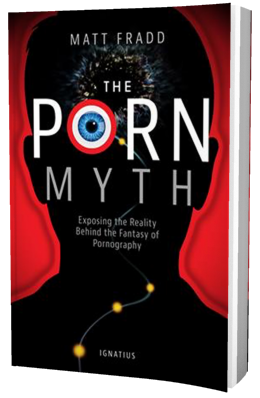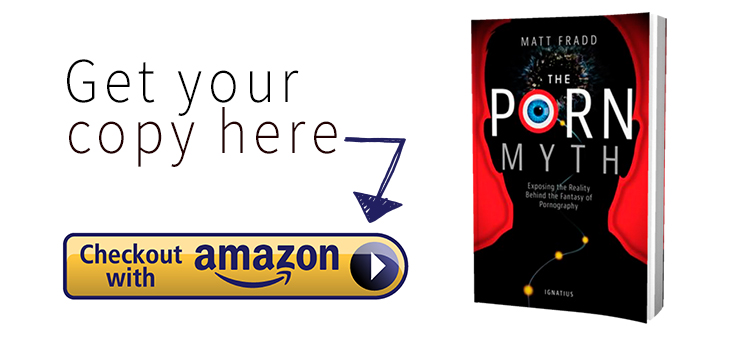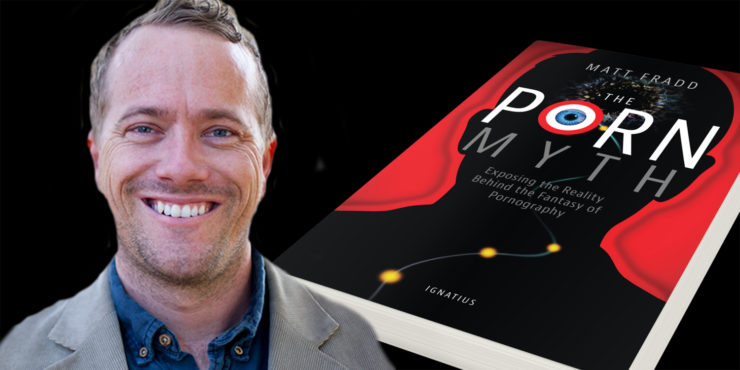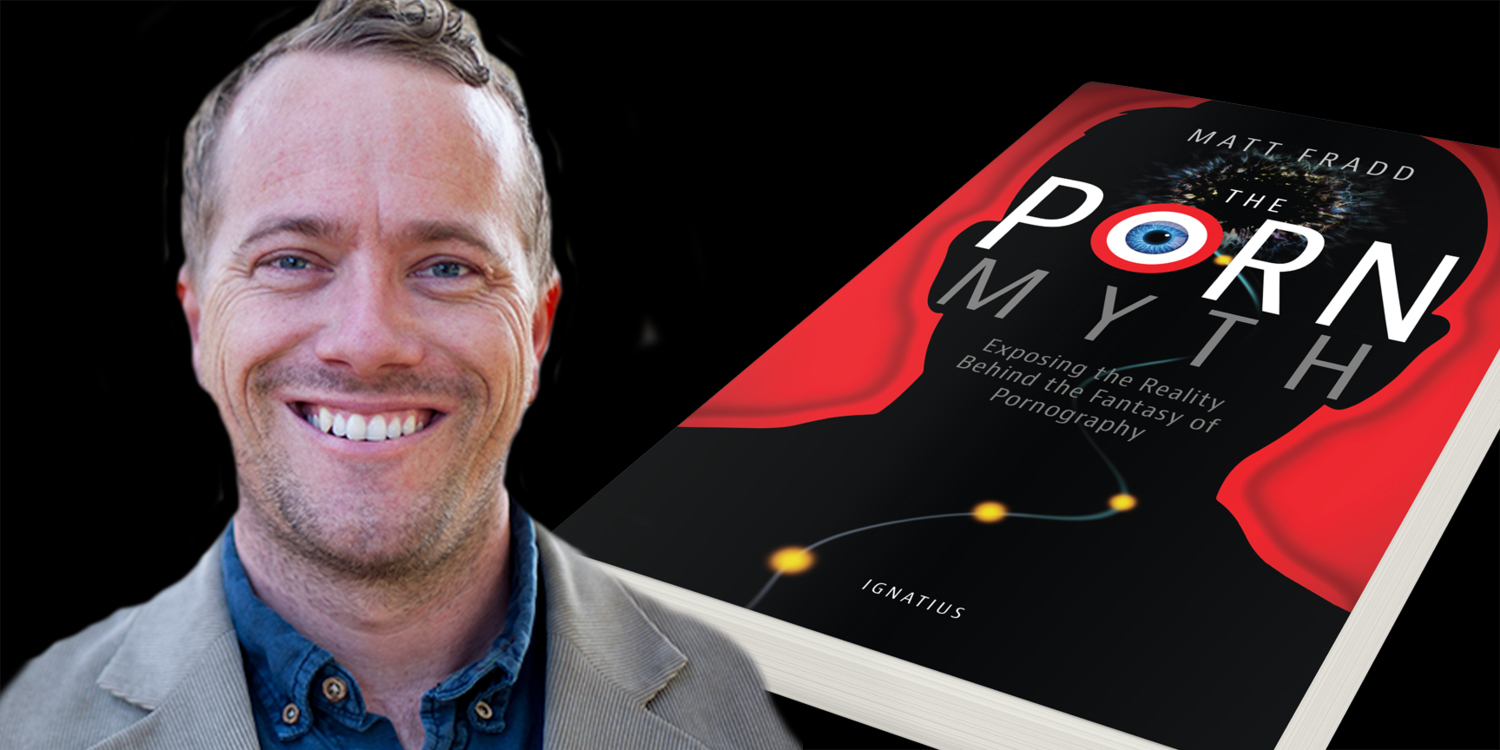Most people know pornography is harmful. It enslaves viewers, rips apart marriages, and denigrates the lives of so many “performers” who end up used, abused, and discarded.
But lots of people, including an increasing amount of young people, think porn is no big deal. In their minds, people only shun porn for religious reasons or because they’re sexually repressed.
So how do you explain why porn is wrong in non-religious terms? That’s what Matt Fradd aims to do in his new book, The Porn Myth: Exposing the Reality Behind the Fantasy of Pornography (Ignatius Press, 2017).
The book is a response to the commonly held belief that pornography is a harmless or even beneficial pastime. Matt draws on the experience of porn performers and users, and the expertise of neurologists, sociologists, and psychologists to demonstrate that pornography is destructive to individuals, relationships, and society. He uses the latest scientific research to discredit the fanciful claims used to defend and promote pornography.
Matt recently sat down to me to discuss his new book and why porn is harmful to everyone involved. Enjoy!
BRANDON VOGT: What is the number one myth about pornography that you encounter? And how do you refute it?
 MATT FRADD: I think the biggest myth surrounds “choice.” We’ve really canonized choice in our culture, haven’t we? Choice is more important than what’s right, what’s good, what’s noble. So people will often say, “Well, people have a right to do whatever they want.” And I usually respond by saying, “Well, people can of course do whatever they want, but it’s prudent before engaging in an action that may have bad effects to take stock of the possible negative consequences of that behavior.”
MATT FRADD: I think the biggest myth surrounds “choice.” We’ve really canonized choice in our culture, haven’t we? Choice is more important than what’s right, what’s good, what’s noble. So people will often say, “Well, people have a right to do whatever they want.” And I usually respond by saying, “Well, people can of course do whatever they want, but it’s prudent before engaging in an action that may have bad effects to take stock of the possible negative consequences of that behavior.”
And so, I really try and educate people and show them that consuming pornography can lead to less satisfying sexual life, it can lead to things like sexual dysfunction, it can lead to sexual aggressiveness, and it can even lead to shrinkage in different parts of the brain, as a 2014 study showed.
These are the sorts of things I wish somebody had told me back when I was 17-18 and engaging in this sort of material. I just thought, like everyone else thought, that this was harmless entertainment and if you were against porn you were somehow anti-sex.
BRANDON VOGT: You talk about a movement called Fight the New Drug. You and others are beginning to refer to pornography more as a drug because of some of its effects. Are there more aspects of pornography that relate to a drug addiction like alcohol, illegal drugs, and things of that nature?
MATT FRADD: Certainly, pornography isn’t a drug in the sense that no one’s injecting it, no one’s inhaling it, that sort of thing. But what pornography consumption does is elicit powerful neurotransmitters in the brain, which the brain can become addicted to.
Very few drugs are addictive. In order for a drug to be addictive, it must do something very specific: it must boost a neurotransmitter called dopamine in the reward center of the brain. Drugs don’t create anything new in the brain, rather they amplify or decrease existing mechanisms in the brain.
All mammals have a reward system in the brain and it’s that thing that gives us a craving to engage in behaviors that are either life-promoting or life-enhancing. That’s we get that big feeling of “I’ve got to have that hamburger” or “I’ve got to work out today” or “I want to have sex.” Without dopamine, sexual activity wouldn’t be that exciting.
So, what pornography does is it boosts that dopamine in the reward center of the brain and a down regulation takes place. The reward center begins to numb itself because of the over stimulation. Dopamine literally begins to atrophy and the person is quite honestly in a state of dopamine craving.
So, in order to boost the levels of dopamine up—you know just to feel normal again—they have to look at pornography. But because the dopamine is atrophying, they often seek more deviant or harder forms of pornography in order to get the same high. That’s how pornography acts like a drug.
BRANDON VOGT: you spend several chapters of your book, The Porn Myth, exploring the relationship between pornography and feminism, and I found this to be quite interesting. It’s not unusual to hear one group saying that pornography is empowering for women while another group at the same time argues that it is demeaning and degrading toward women. Help us sort through that a little bit?
MATT FRADD: Whenever we try to engage with someone we disagree with, it’s always important that we do our best to try to understand them. And so, what might the feminist be saying when they try to say pornography can be liberating?
I think what they might mean is, this old Victorian idea that men enjoy sex while women endure shouldn’t be true. And perhaps, in their estimation, sometimes that’s the way we have looked at sex. So some women would like to say, “Look, I can take charge of my sexuality. Pornography can be a liberating thing for me to do. And if I find it liberating, then it’s liberating.”
Now, the first thing to say is that nobody is yearning to go back to this sort of Victorian, puritanical era where the sight of a woman’s ankle could cause scandal. That seems to me to be clearly unhealthy.
But that doesn’t mean that pornography is therefore liberating to women. Allowing millions of men to pleasure themselves while watching you—in many cases being dominated in very unbeautiful ways—and to think that through this you’re somehow fighting a system of patriarchy, to me that just seems exactly wrong. It seems to me you’re feeding the problem, not fighting it.
BRANDON VOGT: We often hear about the moral concerns with pornography, how it objectifies women and demeans sexuality, but what are some of the non-religious arguments for choosing “real love” over porn as you discuss in your book?
MATT FRADD: I’m going to say something that sounds like it’s out of the middle of a Hallmark card: I think we’re made by love, to love, and for love. And as a Christian, I think that’s theologically accurate, that we have love as our origin, love as our vocation, and love as our destiny. Therefore, if we don’t get love right, we won’t get life right.
The more we participate in activities and behaviors that are contrary to love, the more senseless our life will become. So what is love? Thomas Aquinas would say, “Love is willing the good of the other for the sake of the other.” It seems with pornography consumption at least, something contrary to love is at play. It seems to be merely a matter of use in which I’m not interested in the interior life of this particular performer, her hopes and dreams and aspirations, and so forth. She’s very replaceable. She’s just a collection of body parts and therefore I use her for an ignoble end. And so for that reason, I think no porn use can ever be justified.
Certainly if one uses pornography compulsively, you’ll see more deleterious effects, but even moderate consumption leads to negative effects as well. And so, if we want to have a beautiful life, if we want to have a beautiful sex life, then we should quit porn. I really think, and I’m not trying to be hyperbolic here, that if one is for science and pro-love, then those are two very good reasons one ought to seriously consider being anti-porn.
BRANDON VOGT: Your book, The Porn Myth, concludes with a message of hope. Hope for protecting our children, hope for healing damaged relationships, and hope for breaking addiction for those who may be addicted to this activity. What message of hope would you like to leave readers today?
MATT FRADD: Let me say three things, one to the consumer, one to their spouse, and then one to any parents. To the porn consumer, maybe you’re a man, maybe you’re a woman who consumes pornography, I just want to say, you aren’t your sins. You’re not the bad things you’ve done. You’re not the things you might be addicted to. You are a beloved son or daughter of God, and God certainly is not scandalized by your behavior. He loves you and He knows what you’re really seeking.
What you’re seeking isn’t to hurt people or reduce them to body parts. You’re looking for relief. You’re looking for stimulation and excitement and joy and so forth. And they aren’t to be found in pornography. Just as a brother I would say, trust in the mercy of God. Get to confession if you haven’t already, and then have the strength to consider the possibility that you might need to go to therapy or a 12-step group to get this issue under control.
Second, to the spouses of porn users, I would say this: don’t downplay the trauma that your spouse’s pornography use has taken on you. It’s real and it hurts. Recognize that you’ve undergone a lot and you need healing just as much as your spouse needs healing as well.
Third, to the parents, I would say this: if you’re going to buy your child an electronic device, you must monitor that device. If you’re not willing to monitor it, don’t buy it, because we parents will be held accountable on Judgment Day for how we have raised our children. We must put good filtering and accountability on all of our devices or else what we’re doing is giving our children essentially portable, X-rated movie theaters, and it’s really not their fault when they end up becoming addicted to this stuff.
And so just a word of encouragement to parents, give your kids an internal filter for the unfiltered world in which they live, love them, and don’t get angry with them. Because if you do that they’re never going to come back to you again and maybe share that they’re struggling with this sort of stuff.


